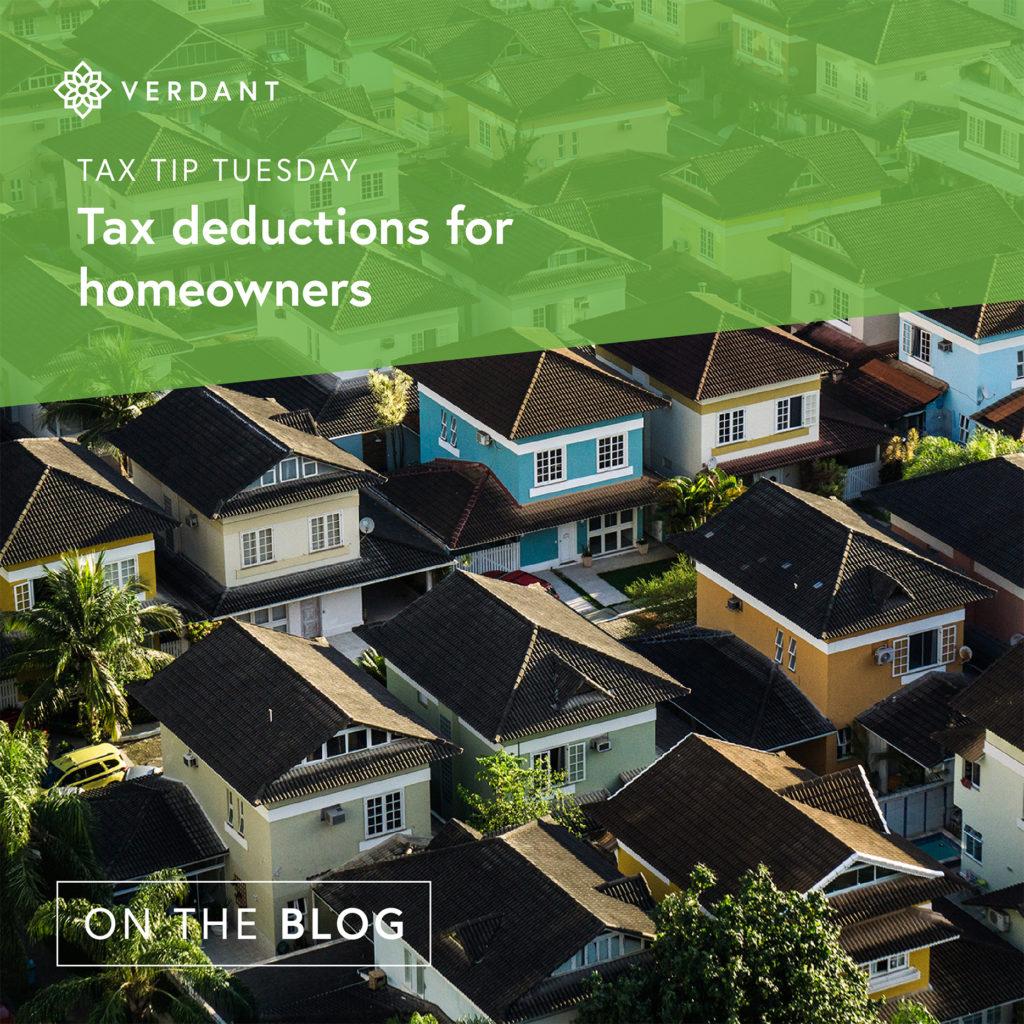Tax Deductions for Homeowners
Owning a home is a huge milestone for most people. It’s probably the biggest investment you’ll make and comes with a ton of financial responsibility. But did you know you can get special tax breaks for simply owning a home? It’s beneficial to know what deductions and credits you can take come tax time to help ease your homeowner’s financial burden.
Getting started
Earlier we discussed tracking business expenses, well, homeowners will need to do the same thing by tracking home-related expenses to take tax deductions. Staying on top of your home-related expenses will save you time and money come tax season.
Staying Organized will save time
If you don’t have frequent home-related expenses, simply tracking expenses in an excel file or notebook will suffice. If you frequent home-related expenses more often then there are apps and websites dedicated to tracking expenses, storing receipts, and staying on budgets.
Here are some recommended apps and websites:
For the 2019 tax year, the federal standard deduction is $24,400 if you’re married filing jointly, $12,200 if you’re single or married filing separately, and $18,350 if you’re filing as head of household.
Home expense deductions
To possibly reduce what you may owe in taxes, take a look at your total cost for home-related expenses. If the total exceeds the standard deduction (rates above), you could reduce your tax bill.
Eligible expenses could include the following:
1. Home mortgage interest
This is usually the biggest tax deduction for homeowners who itemize. A portion of every mortgage payment goes toward interest on the loan. You can deduct the interest you paid up to a limit, which depends on when you took out the mortgage.
Mortgages taken out on or after December 15, 2017 may be able eligible to take a mortgage interest deduction of up to $750,000 of mortgage debt for your primary residence. Mortgages taken out before December 15, 2017 have a limit of $1,000,000. Interest paid on your home equity loan or line of credit may also be deductible if you used the money to buy, build or substantially improve the house that secures the loan.
If you refinanced a mortgage, the limit depends on the old loan’s origination date. If the mortgage predates Oct. 14, 1987, all the mortgage interest may be deductible.
2. Capital appreciation
While the home increases in value during ownership, these gains are not taxed at the federal level. Homeowners can exclude up to $250,000 in home appreciation when figuring their capital gains.
3. Property taxes
You may be able to deduct some (or all) of your property taxes. For federal tax returns, the law allows taxpayers to deduct up to $10,000 ($5,000 if married filing separately) of the total of your state and local property taxes plus either income taxes or state and local sales taxes.
4. Medical home-related improvements
For those who need to make improvements to their homes due to medical conditions, medical expense deductions are available. You can include the cost of installing health care equipment or other medically necessary home improvements that benefit you, your spouse or a dependent.
Permanent improvements that increase your home’s value are only partly deductible. The deductible cost is reduced by the amount of the property value increase.
Many improvements to make a home more accessible usually don’t increase the value of a home and can be fully deducted. These improvements include (but are not limited to):
- Building entrance ramps
- widening doorways
- installing railings and support bars
5. Home equity loan interest
Interest on home equity loans and home equity lines of credit can be deducted, but only if you spent the borrowed money on home improvements.
Your home equity loan counts toward the total mortgage debt limit for deducting interest. If your first mortgage is over the deductible limit, then the home equity loan interest won’t be deductible.
6. Home offices
We’ve previously discussed home office deductions. Check out that post here.
If you own a business and have a dedicated space in your home for an office, you are eligible for a deduction. View the post to see the full requirements.
7. Going Green
Did you know that going green is not only beneficial to the environment but to your tax burden as well? You can get a tax credit worth 30% of the cost of installing a solar energy system.
Note – the IRS is phasing out this tax credit. It will decrease to 26% in 2020 and drop to 22% in 2021 in which it may be the last year to receive this kind of tax credit.
What about home improvement expenses?
Any home improvement expenses are not deductible until you go to sell the house.
Why you ask? Home improvement expenses can be added to your adjusted basis, which is what you originally paid for the house plus the cost of construction, renovation or other improvements you’ve made, minus any losses you’ve experienced from damage to the home.
Expenses that are NOT tax-deductible
Not every bill you front can be a tax deductible. Sometimes responsibility means sacrifice. These items are not tax breaks:
- Home insurance premiums
- Homeowner association fees
- Transfer taxes or stamp taxes
- Utilities
- Rent for living in the home before closing
- Costs for getting or refinancing a mortgage, such as loan assumption, credit report and appraisal fees
- Depreciation
- Forfeited deposits, down payments or earnest money
- Wages for domestic help
If you need help navigating your deduction option as a home-owner, set up a consultation with Verdant today. Your first meeting is always FREE and our licensed CPAs can help clear up your questions and concerns.

